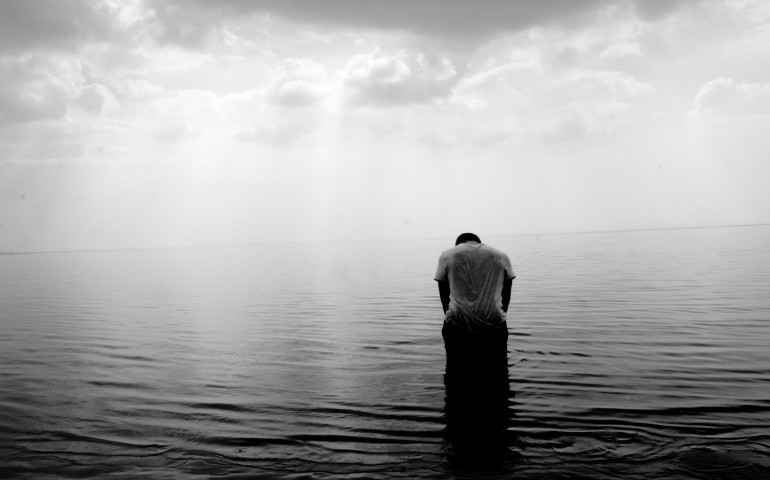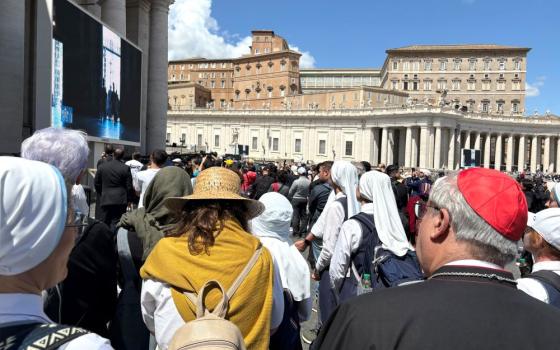
(Unsplash/Joshua Earle)
It used to be more intense, but the struggle is still there. Even now, it is sometimes a battle worthy of war images, but most often it is a quiet, cold conflict that simmers in my soul. I doubt if I will ever get it completely resolved. I may need a couple more lifetimes to be reconciled with it, or, at least, a finely tuned purgatory.
The institutional part of the Catholic Church that once powerfully attracted me now haunts and hurts me. I can't quite get it out of my system. And this conflict messes with my spiritual life.
When I was a young man, I became a priest after 12 years of training in two greenhouse seminaries. I was a priest for seven years, five of them teaching religion to high school boys. I then left the priesthood, was laicized but continued working within the institution as a parish director of religious education, and ultimately at the diocesan level in two different dioceses. I also worked for 10 years at American Airlines, but when I retired in 2006, I was the director of pastoral services for my diocese.
I self-identify as a Catholic and, to all appearances, I am a "practicing Catholic," attending weekly Eucharist at my parish most of the time, participating in parish-sponsored small faith groups, and accepting some leadership roles within that faith community.
So I know the institutional church from the inside looking out and from the outside looking in. There is much about the institution that I flat out reject, and I can say that more freely now that I am no longer a public person representing the institutional church.
I have come to believe that, of the 1.2 billion Catholics in the world today, the institutional church focuses on only a portion of them. For centuries, the official church, consciously or subconsciously, focused on the religious education of children and zeroed in on adults with little developed spiritual maturity. The church's dogmatic and doctrinal rigidity, the either-or moral absolutes, the frozen liturgical rituals, the overpowering hierarchical structures, all seem aimed at adherents who are at an early stage of spiritual awareness — as I was until I was about 30. Unless we are lucky at the parish level, the rest of us are left mostly on our own to find an adult faith.
St. Paul said it well in 1 Corinthians 13:11: "When I was a child I used to talk like a child, think like a child, reason like a child. When I became an adult I put childish ways aside." Much of the institutional church presumes we are still children, and that focus interferes with my spiritual journey. At the risk of sounding arrogant, I am no longer a child. I can handle ambiguity, mystery, both-ands, expandable morality, spontaneity, my own informed conscience, and personal spiritual experiences.
To discover support for these adult spiritual traits within the church, I have to sift through the predominantly child-centered veneer. At this point, many Catholics simply leave the church and find their spiritual resources elsewhere or conclude that the church doesn't connect with their adult lives in any meaningful way. I am tempted to follow them out the door.
But I remain stuck in the middle, trying to balance my spiritual life with parts of the church that remain relevant to me. I am deliberately a cafeteria Catholic, skipping most of the institutional food and being selective about the rest of the buffet. Who can eat all of that fatty food anyway?
I do have criteria for determining what helps my soul see what is real and beneficial. There are four of them:
- I must take time for prayer and meditation in order to recognize the God within me.
- I must have a community of believers to share my story, create and discover our own story, and roam around within the story of God in and for all of us.
- I must experience some ritual that celebrates this God within and among all of us.
- I must do something for other people as Jesus did, some service that helps them in some way.
When I live within these four impulses of the spiritual life, I'm OK. When I slip away from any one of them for a long enough period, I lose my spiritual footing.
At this point, I still experience sufficient support within the umbrella of Catholicism to keep me connected to the official church. My parish community, Pope Francis, spiritual teachers like Fr. Richard Rohr, NCR, and the remarkable service provided to humanity through our hospitals, schools and charitable organizations all meet one or more of my criteria for my spiritual life. Obviously, there are spiritual resources beyond Catholicism that also nourish these four principles.
Life, love and suffering fuel my spiritual journey. I choose the direction and the help I need along the way. Despite its faults, I continue to choose part of the institutional church as an aid to living one or more of these criteria for spiritual growth. I also choose to live with the internal conflict this choice entails. My spiritual growth is what matters most.
Most of the time that choice is worth it. Other times ... not so much. This is just what it is.
[Tom Smith is the author of eight books, most recently Church Chat: Snapshots of a Changing Catholic Church. He and his wife, Fran, live in Shiloh, Illinois. You can read all of the Soul Seeing columns at NCRonline.org/blogs/soul-seeing.]


